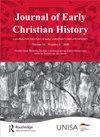Listen to Her: Women as Avatars of Wisdom in Late Ancient Homiletical Discourse
IF 0.1
0 RELIGION
引用次数: 0
Abstract
ABSTRACT For some decades now, historians have focused on attending to or, where possible, retrieving women's voices. In late antiquity, as indeed in other pre-modern eras, this salutary interest has encountered numerous challenges, including in many instances late ancient writers’ interest in obscuring, circumscribing, or otherwise silencing these voices. Ancient authors from Homer onward praised women's silence and worried about women's overly public speech. Early Christians had perhaps more reason for concern than many of their contemporaries; after all, as patristic writers liked to remind their audiences, it was the first woman's dubious counsel that had misled Adam and had put an end to humanity's paradisiacal existence. It is all the more striking when women's voices do emerge as authoritative purveyors of wisdom in late ancient texts, particularly where those voices are depicted as preferable to male wisdom. This article examines three such instances: that of a mother whose teaching discredits a tyrant in Gregory of Nazianzus’ Discourse 15; of a daughter whose insight bests her father's in Isaac's sogitha on the daughter of Jephthah; and that of a wife whose wisdom saves both husband and son in a homily on Abraham and Isaac attributed to Amphilochium of Iconium. The women in these homilies emerge in contexts of crisis—their own violent death or the actual or threatened death of their offspring—and in these homilies become central to these crises’ resolution. In the process, they emerge as avatars of wisdom for late ancient homilists and their audiences. While these texts and the characters narrated in them do not grant access to the voices of historical women, they nevertheless allow readers glimpses into the distinctive shape of women's wisdom in early Christian writings and the discourses surrounding it.听她说:女性是古代后期神学话语中的智慧化身
摘要几十年来,历史学家一直致力于关注或在可能的情况下检索女性的声音。在古代晚期,就像在其他前现代时代一样,这种有益的兴趣遇到了许多挑战,包括在许多情况下,古代晚期作家对掩盖、限制或以其他方式压制这些声音的兴趣。从荷马开始的古代作家都赞美女性的沉默,并担心女性过于公开的言论。早期的基督徒可能比他们同时代的许多人更有理由感到担忧;毕竟,正如爱国主义作家喜欢提醒观众的那样,正是第一位女性的可疑建议误导了亚当,结束了人类的天堂般的存在。当女性的声音在古代晚期的文本中成为权威的智慧提供者时,尤其是当这些声音被描绘成比男性智慧更可取时,这就更加引人注目了。本文考察了三个这样的例子:纳齐安祖斯的格雷戈里的《话语15》中一位母亲的教导诋毁了暴君;有一个女儿,她的洞察力胜过她父亲在以撒的sogitha对耶弗他女儿的洞察力;以及一位妻子的智慧拯救了丈夫和儿子,他在一篇关于亚伯拉罕和艾萨克的布道中被认为是Iconium的Amphlochium。这些布道中的女性出现在危机的背景下——她们自己的暴力死亡或后代的实际或威胁死亡——在这些布道中,她们成为解决这些危机的核心。在这个过程中,他们成为了古代后期的能人和观众的智慧化身。虽然这些文本和其中叙述的人物并不能让读者听到历史女性的声音,但它们让读者得以窥见早期基督教著作中女性智慧的独特形态及其周围的话语。
本文章由计算机程序翻译,如有差异,请以英文原文为准。
求助全文
约1分钟内获得全文
求助全文

 求助内容:
求助内容: 应助结果提醒方式:
应助结果提醒方式:


